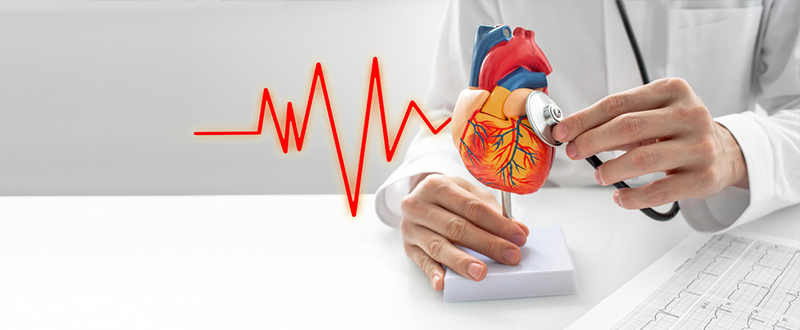What are Vascular Disease and High Blood Pressure?

Hypertension, or high blood pressure, puts excessive strain on the coronary arteries; the build-up of cholesterol, fat, other substances, resulting in the arteries getting constricted. High blood pressure can damage your heart muscles, which can result in vascular conditions.
Vascular disease is a medical condition where the network of blood vessels are affected, known as the vascular or circulatory system. The purpose of these blood vessels is to oxygenate the blood, move blood, food, and other nutrients through arteries to the heart. The vascular disease causes a severe effect on the blood flow, leading to life-threatening problems like severe heart conditions, stroke, or heart attacks.
Four Stages of Hypertension
- Normal – 120 mm Hg systolic and 80hg diastolic
- Elevated – Between 121 to 129 mm Hg systolic and 81 to 89 mm Hg diastolic
- Stage 1 – Between 130 to 139 mm Hg systolic and 90 to 99 diastolic
- Stage 2 – Above 140 mm Hg systolic and 100 diastolic
Types of Hypertension
- Primary Hypertension
Adults are mostly diagnosed with primary hypertension, for which the particular cause is yet to be discovered. The researchers have narrowed down the risk factors associated with this type into age, genetics, stress, and lifestyle, where the lifestyle factors demonstrate alcohol consumption, smoking, obesity, and diet.
- Secondary Hypertension
It is mostly observed that over 30% of young adults ageing between 18 to 40 years suffer from secondary hypertension. The causes behind this type can be narrowed down to arteries, side effects from some medications, obstructive sleep apnea, adrenal gland disease, thyroid, hormone abnormalities, and constricted aorta.
- Resistant Hypertension
When the blood pressure is still high despite the treatment, this type is difficult to control, and it needs several medications. It has also been observed that some people with resistant hypertension also suffer from secondary hypertension, where the causes are yet to be identified. Once the cause is identified people diagnosed with resistant hypertension can be treated with multiple medications.
- Malignant Hypertension
People diagnosed with malignant hypertension can suffer from organ damage. This is the severe type of hypertension, where the patient might have above 180 systolic and 120 diastolic. If you think you are suffering from hypertension, then you need to opt for emergency medical treatment.
Conclusion
Hypertension and vascular disease are the common conditions, and with regular medication, it can be treated. However, it can put significant pressure on your cardiovascular system. Thus, seeking standard treatment and making necessary lifestyle changes can help you to control your blood pressure levels.
Note of caution: This article is for information purpose only. Always consult your doctor in case of any blood pressure or other health-related problems.

 Stress
Stress Family history
Family history Smoking
Smoking Alcohol
Alcohol Diabetes
Diabetes Kidney infection
Kidney infection Deficiency of vitamin D
Deficiency of vitamin D Ageing
Ageing Severe headaches
Severe headaches Breathlessness
Breathlessness Nosebleed
Nosebleed Exhaustion
Exhaustion Confusion
Confusion Vision problems
Vision problems Chronic chest pain
Chronic chest pain Irregular heartbeat
Irregular heartbeat Pounding chest
Pounding chest Anxiety
Anxiety Palpitations
Palpitations Pulsation
Pulsation Adults are mostly diagnosed with primary hypertension, for which the particular cause is yet to be discovered. The researchers have narrowed down the risk factors associated with this type into age, genetics, stress, and lifestyle, where the lifestyle factors demonstrate alcohol consumption, smoking, obesity, and diet.
Adults are mostly diagnosed with primary hypertension, for which the particular cause is yet to be discovered. The researchers have narrowed down the risk factors associated with this type into age, genetics, stress, and lifestyle, where the lifestyle factors demonstrate alcohol consumption, smoking, obesity, and diet. It is mostly observed that over 30% of young adults ageing between 18 to 40 years suffer from secondary hypertension. The causes behind this type can be narrowed down to arteries, side effects from some medications, obstructive sleep apnea, adrenal gland disease, thyroid, hormone abnormalities, and constricted aorta.
It is mostly observed that over 30% of young adults ageing between 18 to 40 years suffer from secondary hypertension. The causes behind this type can be narrowed down to arteries, side effects from some medications, obstructive sleep apnea, adrenal gland disease, thyroid, hormone abnormalities, and constricted aorta. When the blood pressure is still high despite the treatment, this type is difficult to control, and it needs several medications. It has also been observed that some people with resistant hypertension also suffer from secondary hypertension, where the causes are yet to be identified. Once the cause is identified people diagnosed with resistant hypertension can be treated with multiple medications.
When the blood pressure is still high despite the treatment, this type is difficult to control, and it needs several medications. It has also been observed that some people with resistant hypertension also suffer from secondary hypertension, where the causes are yet to be identified. Once the cause is identified people diagnosed with resistant hypertension can be treated with multiple medications. People diagnosed with malignant hypertension can suffer from organ damage. This is the severe type of hypertension, where the patient might have above 180 systolic and 120 diastolic. If you think you are suffering from hypertension, then you need to opt for emergency medical treatment.
People diagnosed with malignant hypertension can suffer from organ damage. This is the severe type of hypertension, where the patient might have above 180 systolic and 120 diastolic. If you think you are suffering from hypertension, then you need to opt for emergency medical treatment.
Comments (0)
No comments found.Add your comment